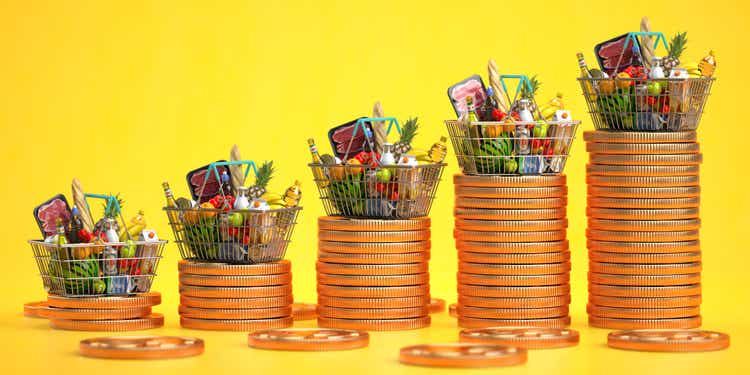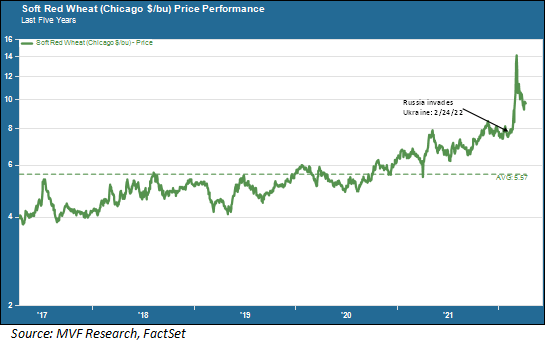Bet_Noire/iStock via Getty Images
You have probably noticed that prices at the grocery store are higher than they were a year ago, but some, like cereal and sunflower oil, are a whole lot higher. For most of us in developed Western countries that is an annoyance, but a more or less bearable one. Not so in other parts of the world. On average, food costs account for around seventeen percent of consumer spending in the developed world, but in sub-Saharan Africa, for example, around 40 percent of household spending goes towards food products. That’s a big problem when you see a chart like the one below, showing the price trend for wheat over the past five years.

Fallow Fields
Russia’s invasion of Ukraine, as shown in the above chart, caused a near-doubling of the price of wheat from where it was in late 2021. Together, Russia and Ukraine account for around 30 percent of the total global wheat market and are major exporters of grains and sunflower oil. With the war in Ukraine showing no signs of abating, it is estimated that somewhere between 20 to 30 percent of the arable land in the country producing its agricultural bounty – Ukraine after all has been called the “breadbasket of Europe” — will not be planted this year, meaning no harvests later in the summer and no exports to the many countries around the globe that depend on these exports for their own food sufficiency.
This impending food crisis has been somewhat overlooked in developed-world analysis about the economic effects of the crisis in Ukraine, with the focus being more on energy prices, Europe’s dependence on Russian gas, and related issues. But the food shortages that threaten much of the developing world, from sub-Saharan Africa to the Middle East and Asia-Pacific, could potentially reverse much of the gains achieved in recent years in lifting people out of poverty. The World Bank recently warned that a prolonged war in Ukraine could push millions of people back below the poverty line and engender a national debt crisis for potentially dozens of countries. This, in turn, will have a negative effect on global growth and is a major reason why the World Bank and the IMF, among others, have been recently lowering their estimates for world GDP growth. And this comes at a time, of course, when much of the world is still struggling to come out of the economic blow from the pandemic.
Inflation And Its Discontents
Back in the developed world the situation, while less lethal, is creating problems of its own. The food price index from the UN Food and Agriculture Organization is at a record high, 34 percent up from its level one year ago. For most people, the most visceral direct impact of inflation is felt in the supermarket aisles and at the gas pump. Persistently rising prices creates discontent, and that discontent tends to get expressed whenever possible at the ballot box. This weekend, for example, French citizens will go to the polls in the first round of national elections that will determine whether Emmanuel Macron gets to keep his job as president for another term. Even a couple weeks ago this was seen by most political observers as a yawner, with Macron expected to cruise to victory. But polls have tightened considerably. Now the most likely scenario is that Macron and perennial far-right candidate Marine Le Pen will each receive enough votes to force a second-round runoff, and the current polling suggests that Macron’s lead in that head-to-head matchup could be within a statistical margin of error.
In the US, the Consumer Price Index will come out next Tuesday and economists expect to see year-on-year growth in the headline CPI register 8.5 percent, which would be the highest level since 1982. Now, simply based on the period of comparison, the year-on-year number is likely to start going down after the April release. But that is not going to mean very much to people who – given those food price trends we described above – are still going to be shelling out more every time they go to the local Giant or Kroger’s. If this is still a problem come November, the results are likely to be catastrophic for Democrats in the US midterm elections.
Globalization has been the organizing principle of the world economy for the past four decades. It has brought efficiency and convenience to developed countries, and pulled a plurality of the developing world into something approximating a middle-class existence. Of course, it has brought about less savory outcomes as well, including growing wealth inequality and a fraying social safety net. For better or worse, though, if this organizing principle truly is going into reverse, as BlackRock’s Larry Fink opined in a recent letter to his firm’s shareholders, then there will be many unknowns ahead. Unknowns will beget more unknowns, and we will have to be ready to figure them out.
Editor’s Note: The summary bullets for this article were chosen by Seeking Alpha editors.


Be the first to comment